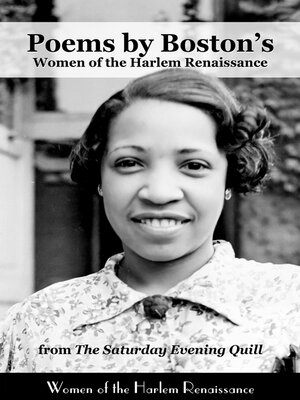Poems by Boston's Women of the Harlem Renaissance
ebook ∣ Voices Restored: Women of the Harlem Renaissance
By Helene Johnson

Sign up to save your library
With an OverDrive account, you can save your favorite libraries for at-a-glance information about availability. Find out more about OverDrive accounts.
Find this title in Libby, the library reading app by OverDrive.



Search for a digital library with this title
Title found at these libraries:
| Library Name | Distance |
|---|---|
| Loading... |
This anthology is a compilation of all the poems written by women and published in The Saturday Evening Quill, a little-known Harlem Renaissance literary journal produced by a talented group of African American writers in Boston. The poets in this collection are as remarkable as their poems. They were teachers, researchers, intellectuals, and champions of social justice. Living outside New York's literary hub never deterred them from pursuing their creative art.
W.E.B. Du Bois wrote of The Saturday Evening Quill: "Of the booklets issued by young Negro writers in New York, Philadelphia and elsewhere, this collection from Boston is by far the most interesting and the best."
Poems by Helene Johnson, Edythe Mae Gordon, Marion Grace Conover, Alice E. Furlong, Alvira Hazzard, Gertrude P. McBrown, Grace Vera Postles, illustrations by Loïs Mailou Jones
The Saturday Evening Quill Club, a group of talented African American writers, met on the fourth Saturday of each month in Eugene and Edythe Gordon's home in Cambridge, Massachusetts. Comprised of men and women in nearly equal numbers, the club served as a supportive community for its members, ranging from young writers at the start of their careers to more experienced mentors. The club attracted Massachusetts natives and newcomers who had moved to the area for work or study.
In 1928, Eugene Gordon led this extraordinary group in producing 250 copies of the first issue of The Saturday Evening Quill, a 72-page paper-bound publication featuring short stories, essays, poems, and visual art. Two more annual issues followed in 1929 and 1930.







